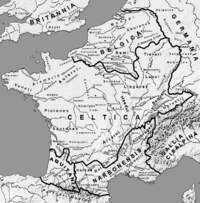.gif)
Parisii (Gaul)
Encyclopedia




Celt
The Celts were a diverse group of tribal societies in Iron Age and Roman-era Europe who spoke Celtic languages.The earliest archaeological culture commonly accepted as Celtic, or rather Proto-Celtic, was the central European Hallstatt culture , named for the rich grave finds in Hallstatt, Austria....
ic Iron Age
Iron Age
The Iron Age is the archaeological period generally occurring after the Bronze Age, marked by the prevalent use of iron. The early period of the age is characterized by the widespread use of iron or steel. The adoption of such material coincided with other changes in society, including differing...
people that lived on the banks of the river Seine
Seine
The Seine is a -long river and an important commercial waterway within the Paris Basin in the north of France. It rises at Saint-Seine near Dijon in northeastern France in the Langres plateau, flowing through Paris and into the English Channel at Le Havre . It is navigable by ocean-going vessels...
(in Latin, Sequana
Sequana
In Gallo-Roman religion, Sequana was the goddess of the river Seine, particularly the springs at the source of the Seine, and the Gaulish tribe the Sequani...
) in Gaul
Gaul
Gaul was a region of Western Europe during the Iron Age and Roman era, encompassing present day France, Luxembourg and Belgium, most of Switzerland, the western part of Northern Italy, as well as the parts of the Netherlands and Germany on the left bank of the Rhine. The Gauls were the speakers of...
from the middle of the third century BC until the Roman era. With the Suessiones
Suessiones
The Suessiones were a Belgic tribe of Western Belgium in the 1st century BC, inhabiting the region between the Oise and the Marne, based around the present-day city of Soissons...
, the Parisii participated in the general rising of Vercingetorix
Vercingetorix
Vercingetorix was the chieftain of the Arverni tribe, who united the Gauls in an ultimately unsuccessful revolt against Roman forces during the last phase of Julius Caesar's Gallic Wars....
against Julius Caesar
Julius Caesar
Gaius Julius Caesar was a Roman general and statesman and a distinguished writer of Latin prose. He played a critical role in the gradual transformation of the Roman Republic into the Roman Empire....
in 52 BC.
Their chief city (oppidum
Oppidum
Oppidum is a Latin word meaning the main settlement in any administrative area of ancient Rome. The word is derived from the earlier Latin ob-pedum, "enclosed space," possibly from the Proto-Indo-European *pedóm-, "occupied space" or "footprint."Julius Caesar described the larger Celtic Iron Age...
) was on the site of Lutetia
Lutetia
Lutetia was a town in pre-Roman and Roman Gaul. The Gallo-Roman city was a forerunner of the re-established Merovingian town that is the ancestor of present-day Paris...
, which later became an important city in the Roman province of Gallia Lugdunensis
Gallia Lugdunensis
Gallia Lugdunensis was a province of the Roman Empire in what is now the modern country of France, part of the Celtic territory of Gaul. It is named after its capital Lugdunum , possibly Roman Europe's major city west of Italy, and a major imperial mint...
and ultimately the modern city of Paris
Paris
Paris is the capital and largest city in France, situated on the river Seine, in northern France, at the heart of the Île-de-France region...
. (The name Paris is derived from Parisii).
Barry Cunliffe in Iron Age Communities in Britain (1974) p. 45, distinguishes the Parisii as those in the Nanterre-Paris region, and the Parisi as those who moved to Britain, based on Ptolemy's descriptions.

